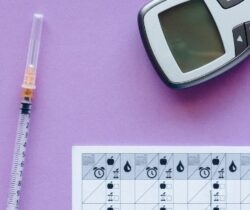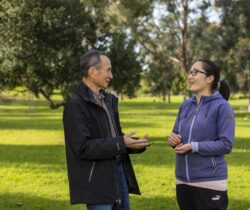Diabetes is one of the biggest challenges facing Australia’s health system, with 1.8 million Australians living with the condition and over 280 Australians diagnosed every day (Source: Diabetes Australia).
If left untreated, diabetes can lead to serious health complications; such as blindness, amputations, kidney damage and heart disease.
What is type 2 diabetes?
Type 2 diabetes accounts for 85-90% of all diabetes cases in Australia (Source: Nutrition Australia) and occurs when cells within the body become resistant to insulin.
Type 2 diabetes is more common in older adults, but is on the rise among adolescents and children, and may be delayed or prevented through lifestyle changes.
What are the symptoms of type 2 diabetes?
The symptoms that are commonly associated with type 2 diabetes are:
- Feeling thirsty
- Feeling tired
- Feeling hungry
- Needing to go to the toilet more to pass urine
- Infections, such as urinary tract or thrush
- Skin rashes and/or itching
- Headaches
- Blurred vision
- Cuts that heal slowly
(Source: Diabetes Victoria)
If you have these symptoms, it is strongly recommended that you consult your doctor. That way, you can be tested for type 2 diabetes. The earlier type 2 diabetes is detected, the easier it is to manage.
Who is at risk of type 2 diabetes?
While anyone can get type 2 diabetes and the direct cause is unknown, you are at highest risk if:
- diagnosed with prediabetes
- Aboriginal or Torres Strait Islander descent and aged 35 years and over
- Pacific Islanders, Maori or Asian (including the Indian subcontinent, or of Chinese origin) descent and aged 35 years and over
- Middle Eastern, North African or Southern European descent
- Aged 45 and over and obese or overweight, have high blood pressure or have a first-degree relative with type 2 diabetes
- Cardiovascular disease history such as heart attack, angina, stroke, narrowed blood vessels
- Diagnosed with Polycystic Ovary Syndrome (PCOS) and overweight
- Diagnosed gestational diabetes (GDM) during pregnancy
- Aged 55 or over
- Taking certain antipsychotic medicine or corticosteroid medicine
How can you prevent type 2 diabetes?
Preventing type 2 diabetes may be possible through a healthy diet, exercise and weight management.
Below, we’ve listed some of the things you can do to prevent type 2 diabetes; from making changes to your diet and physical activity levels, to managing your blood pressure.
Maintaining a healthy weight
Maintaining a healthy weight lowers your risk of diabetes, as well as lowering your risk of heart disease, stroke and some cancers. You can achieve this by making small changes to your diet such as reducing your portion sizes.
If you have prediabetes, losing 5-10% of your current body weight can help prevent type 2 diabetes in nearly 6 out of 10 people (Source: Diabetes Australia).
Regular physical activity
Engaging in regular exercise not only plays an important role in a healthy lifestyle, it helps the prevention of type 2 diabetes in the following ways:
- Increasing insulin sensitivity
- Maintaining a healthy weight
- Lowering blood pressure
- Reducing risk of heart disease
- Lowering stress levels
For good health, you should be aiming for about 30 minutes of exercise every day. If this is not possible, then this time can be divided into 3 sessions (10 minutes each). You can break up exercise throughout the day. If you need to lose weight, 45-60 minutes everyday is encouraged instead (Source: Diabetes Australia).
Eating a healthy diet
A good diet provides your body with optimal nutrients to improve your physical health and prevent type 2 diabetes. To stay healthy, aim for consistently eating a balanced diet that includes all five of the food groups according to the Australian Guide to Healthy Eating;
- Vegetables and legumes/beans
- Grain (cereal) foods, mostly wholegrain and/or high fibre cereal varieties
- Lean meats and poultry, fish, eggs, tofu, nuts and seeds and legumes/beans
- Reduced fat milk, yoghurt, cheese and/or alternatives
- Fruit
Additionally, aim for portion sizes that are enough to satisfy your hunger.
Managing blood pressure
High blood pressure is a risk factor for type 2 diabetes, as well as stroke, heart disease, kidney disease, eye disease and nerve damage.
The steps you can take to reduce blood pressure include:
- Stopping smoking
- Losing excess weight
- Performing regular physical activity
- Have less salt intake in your diet and/or reduce processed foods
- Limiting alcohol consumption
It is important to have your blood pressure checked at every doctor’s visit, at least:
- Every 6 months for people with normal blood pressure
- Every 3 months for people with high blood pressure
- Every 4-8 weeks if your blood pressure medication is being changed
(Source: Diabetes Australia)
Can the Life! program help prevent type 2 diabetes?
Yes! the Life! program offers a variety of tools that can help prevent or delay the onset of type 2 diabetes. For example, the online health check helps you assess your risk of type 2 diabetes with a simple form that takes only 2 minutes to complete.
Life! is a free healthy lifestyle program that helps you improve your eating habits, increase your physical activity and manage stress. You can choose from a group course or the Telephone Health Coaching service.
Our experienced health professionals will help you make small changes to your lifestyle so that you can achieve your health goals and reduce your risk of type 2 diabetes and cardiovascular disease.
Life! is funded by the Victorian government and managed by Diabetes Victoria. You can check your eligibility for the program here.
Sources
https://www.diabetesaustralia.com.au/about-diabetes/diabetes-in-australia/
https://www.diabetesaustralia.com.au/about-diabetes/prevention/
https://www.diabetesaustralia.com.au/food-activity/exercise/
https://www.diabetesaustralia.com.au/living-with-diabetes/preventing-complications/blood-pressure/
https://nutritionaustralia.org/fact-sheets/diabetes/
Reviewers:
Sarah Dubé, Strategy and Engagement Lead
Tegan Kohlman, Communications and Social Marketing Officer





